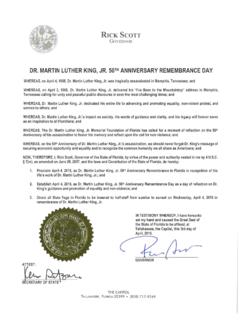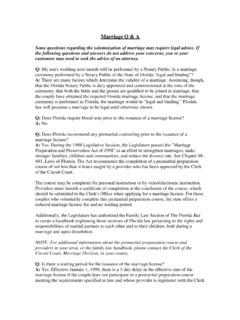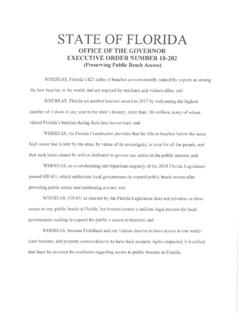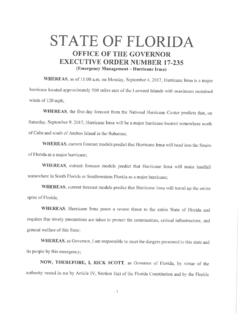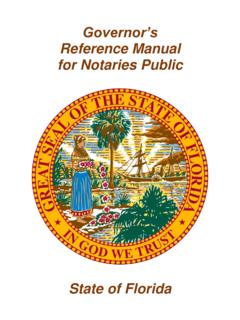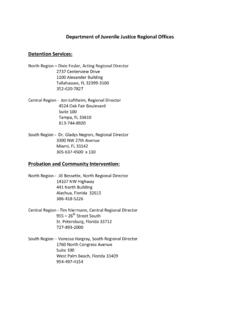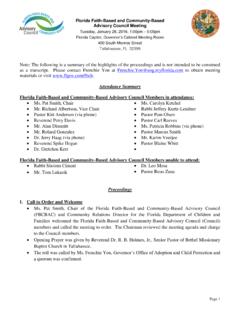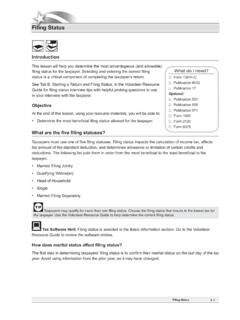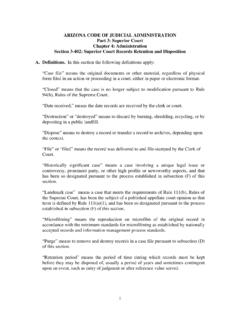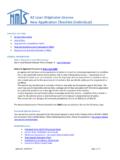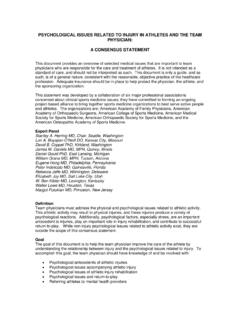Transcription of Q: Can I notarize signatures for immediate family? Q: Can ...
1 Updated 6/21/2018 Q: Can I notarize signatures for immediate family? Q: Can I refuse to provide notary services? Q: What should I do if a person produces identification with a name different from the name being signed? Q: When I personally know the signer, am I required to indicate that fact in my notarial certificate? Q: May I attest to a photocopy of a resident alien card issued by the Department of Justice, Immigration and Naturalization Service? Q: Can I sign a document as one of the witnesses if I am also acting as the notary public for that transaction? Q: Can I certify a photocopy of a tax return for customers who are enrolling their children in college or applying for a mortgage on a new home? Q: May I require the fingerprints of a person for whom I notarize ? Q: Must a notary public sign the notarial certificate when notarizing a signature? Q: May I notarize a signature on a document that has been prepared in another state, or on a document that will be sent to another state or country?
2 Q: When notarizing a signature, what elements must be included in my notarial certificate? Q: How do I file a complaint against a notary ? Q: How long does a notary Complaint take? Q: How do I resign my notary commission? Q: Is there a shortcut for renewing my notary commission? Q: Do I keep my notary Stamp even if I am no longer employed or was fired from my previous job? Q: How do I look up a notary ? OR I can t remember my notary certificate number, is there a way I can look that up? Q: I am moving in-state and need to update my address OR I am moving out of state. Q: I legally changed my name, how do I update and can I still use my old stamp? Q: I m a notary in another State and I m about to move to Florida, does my notary commission transfer states? Q: I need to a copy of my notary Certificate OR I need to report my stamp lost or stolen. Q: I want to become a notary , but I have a misdemeanor and/or a felony on my record.
3 Does that make me ineligible? Q: Can I notarize signatures for immediate family? A: A notary public may not notarize a signature on a document if the person whose signature is to be notarized is the spouse, son, daughter, mother, or father of the notary public. A notary public may notarize a signature for immediate family members on a marriage certificate. Q: Can I refuse to provide notary services? A: Yes, a notary may refuse to perform a notarization. The situations in which a notary must refuse are set forth in the Florida Statutes sections and Updated 6/21/2018 Q: What should I do if a person produces identification with a name different from the name being signed? A: This problem may occur in different situations. In some situations, individuals may have simply neglected to update their identification cards after a name change. You should direct them to the local Division of Motor Vehicles office to make the necessary changes.
4 In some instances, individuals may need to sign a document with their former name after making the necessary updates to their identification cards. A classic situation arises when a woman changes her name after marriage and has to sign a document, such as a warranty deed, in her former name. You may notarize her signature if she signs both names, but you may want to indicate that fact in your notarial certificate. For an acknowledgment, you could state, "The foregoing instrument was acknowledged before me this _____ day of _____, 19__, by Mary Smith, who represented to me that she was formerly known as Mary Jones, and who provided a Florida driver license, No. 123 45 678 890 in the name of Mary Smith as identification." You may also want to include information such as the date of birth, expiration date, or physical description. You may always provide additional information in your certificate, especially if it helps to clarify the circumstances.
5 You may also want to include information about supporting documentation concerning the name change or additional identification cards, if available, in your journal. Q: When I personally know the signer, am I required to indicate that fact in my notarial certificate? A: Yes. When notarizing a signature, a notary public must always certify the type of identification relied upon, either personal knowledge or other form of identification produced. This can be done as part of the main wording in the notarial certificate or at the bottom of the certificate. We have seen notarized documents where the notary simply noted "PK" or "DL", meaning "personally known" or "driver's license." These abbreviations are not clear, and we recommend that you make more specific notations about identification. Although not required, it is a good practice to indicate the identification card number and the state or country that issued the card.
6 This will help to protect you in case a signer later claims that he or she did not sign the document and did not appear before you for the notarization. Q: May I attest to a photocopy of a resident alien card issued by the Department of Justice, Immigration and Naturalization Service? A: Yes. This is a frequent request in Florida because of the large number of resident aliens living here. We have consulted the office of Immigration and Naturalization Service in Miami and learned that a person cannot obtain a certified copy of a resident alien card from any INS office. Therefore, if you have the original card, you may attest to the trueness of a photocopy if you make the copy or supervise the making of the copy. You should use a notarial certificate in substantially the same form as that provided in the notary law for attested photocopies. Updated 6/21/2018 The INS office emphasized that an attested photocopy of a resident alien card should not be used to prove residency status.
7 Although the notary is not responsible for how the attested photocopy will be used, it may be a good idea to refer the party to an INS office if such certification is needed. If you believe that an attested copy may be used for an improper purpose, you should decline to attest to the copy. Q: Can I sign a document as one of the witnesses if I am also acting as the notary public for that transaction? A: Generally, a notary public may sign as one of the witnesses and as the notary public on a document. In fact, it is a common practice among Florida notaries, particularly on real estate transactions. Typically, you will see the title clerk sign as one of the two required witnesses and then notarize the document signer's signature. In addition, a Florida court has held that "there is nothing to prevent a notary from also being a witness." See Walker v. City of Jacksonville, 360 52 (Fla. 1st DCA 1978).
8 However, before signing as a witness, the notary should ensure that the document does not require the notarization of the witnesses' signatures . For example, a self-proof affidavit on a will or codicil requires the notarization of the signatures of the testator and both witnesses. If the notary signed as a witness in this instance, he or she would be notarizing his or her own signature, which is a criminal violation of the notary law. The notary should also certify in the notarial certificate the name of the person whose signature is being notarized. Absent such specific notation, the law presumes that all signatures were notarized. Thus, the notary could unintentionally notarize his or her own signature if the notarial certificate is not specific. Therefore, providing that the document does not require the notarization of the witnesses' signatures , the notary may be one of the two subscribing witnesses as well as the notary public.
9 Q: I am often asked to certify a photocopy of a tax return for customers who are enrolling their children in college or applying for a mortgage on a new home. May I do so? A: No. Section (12), Florida Statutes, which authorizes notaries to attest to photocopies, requires the following: the notary may not certify a copy of a public record, if a copy can be obtained from the official source; the notary must have the original document from which to make the copy; the notary must either make the copy or supervise the making of the copy; and the notary must complete a certificate in substantially the form specified in the law. In this case, the original tax forms have been filed with the Internal Revenue Service, and no original is available from which you can photocopy the document. However, certified copies are available from IRS. For additional information, your customer should visit an office of the Internal Revenue Service or call (800) 829-1040.
10 Q: May I require the fingerprints of a person for whom I notarize ? A: No. Florida law does not require, nor authorize, notaries to take fingerprints from persons whose signatures they notarize . Many notary journals or records books allow space for a Updated 6/21/2018 thumbprint, but this feature is optional. If there is no objection from the signer, you may record a thumbprint in your journal. However, you should not refuse to provide notary services based solely on the person's refusal to provide a fingerprint in your record book. Q: Must a notary public sign the notarial certificate when notarizing a signature? A: Yes. When notarizing a signature, you are required by law to date, sign, and affix your seal to a notarial certificate. See (3)(a) and (4), Fla. Stat. This is in addition to the requirements that your notary seal contain your exact commissioned name and that you must print, type, or stamp your name below your signature.
